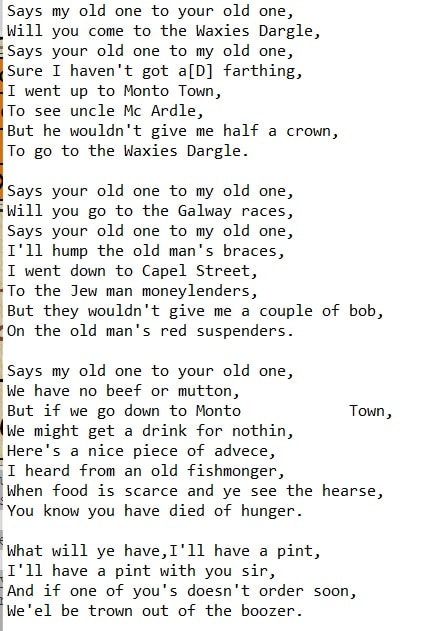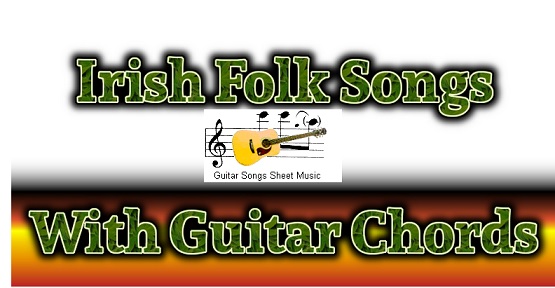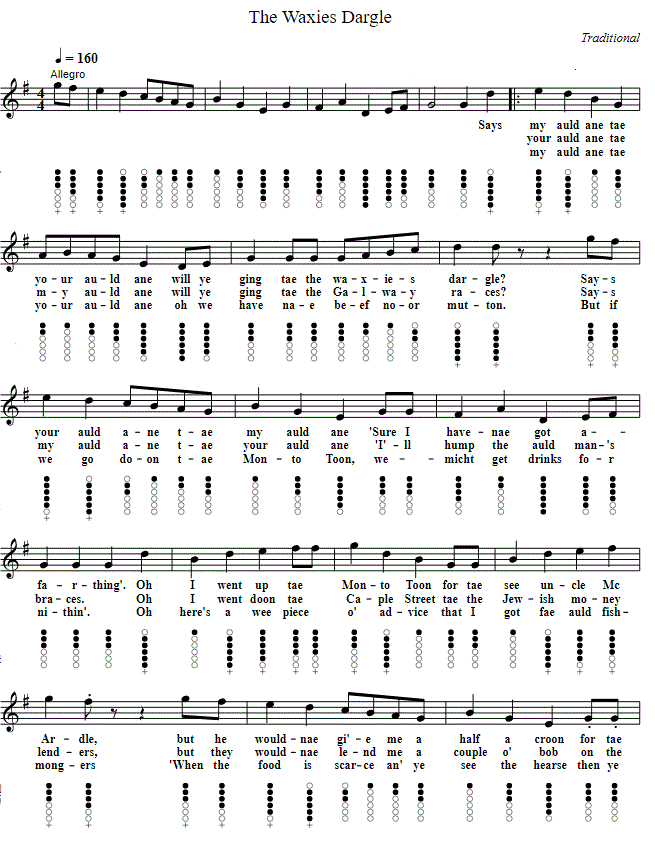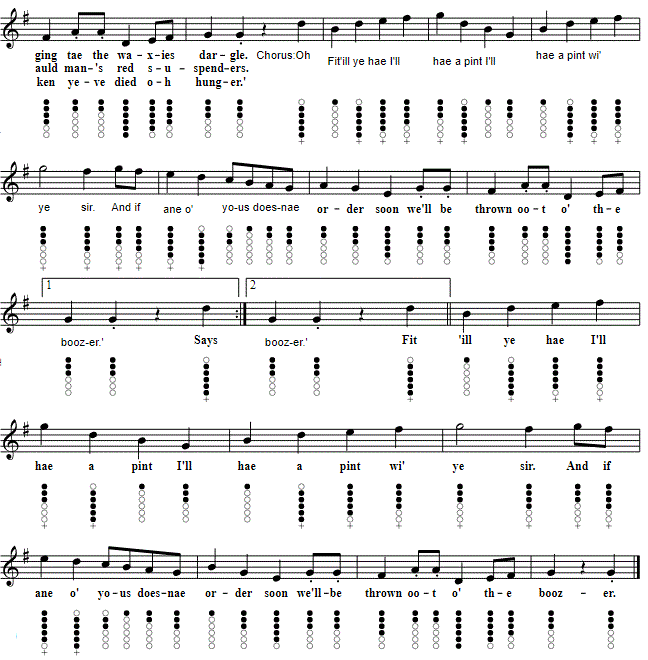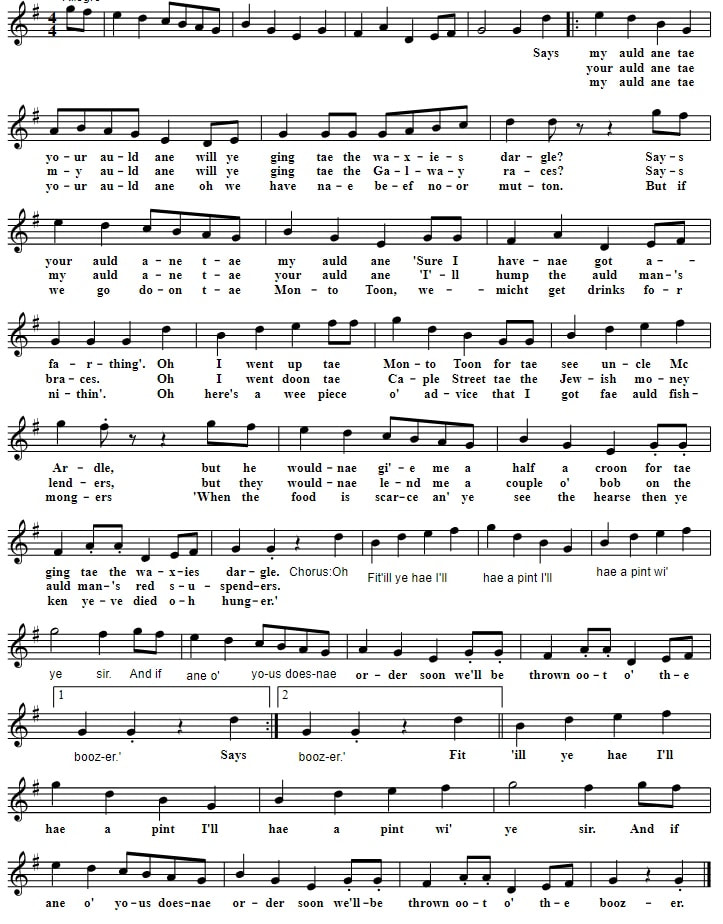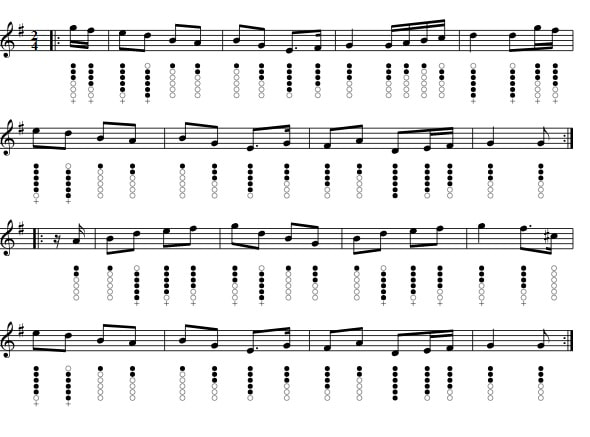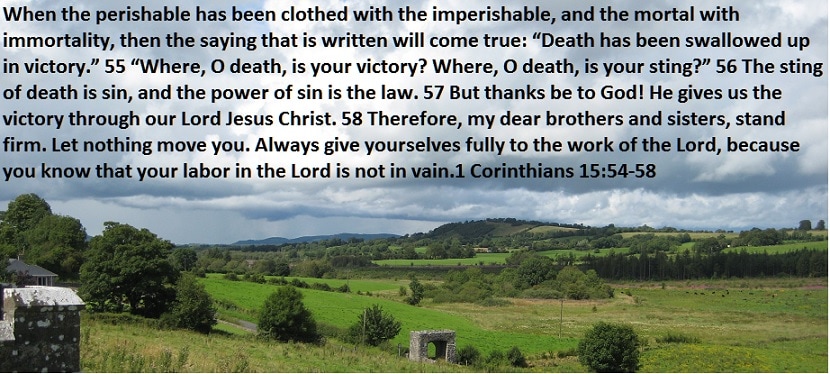The Waxies Dargle lyrics and chords
A traditional Irish folk song which was recorded by The Pogues, The Dubliners and The Dublin City Ramblers. The Video Is The Pogues.Waxies are candlemakers,and The Waxies Dargle was their annual trip to Bray Co. Wicklow. The sheet music and tin whistle notes are included. Guitar chords are in chordpro and in the key of D and G Major.
Says[D] my old one to[G] your old one,
Will you[D] come to the Waxies Dargle,
Says your old one to[G] my old one,
Sure I[A] haven't got a[D] farthing,
I went up to Monto Town,
To see uncle[G] Mc Ar[[A]dle,
But he[D] wouldn't give me[G] half a crown,
To[A] go to the Waxies[D] Dargle.
[2]
Says your old one to my old one,
Will you go to the Galway races,
Says your old one to my old one,
I'll hump the old man's braces,
I went down to Capel Street,
To the Jew man moneylenders,
But they wouldn't give me a couple of bob,
On the old man's red suspenders.
[3]
Says my old one to your old one,
We have no beef or mutton,
But if we go down to Monto [ lyrics ] Town,
We might get a drink for nothin,
Here's a nice piece of advece,
I heard from an old fishmonger,
When food is scarce and ye see the hearse,
You know you have died of hunger.
What will ye have,I'll have a pint,
I'll have a pint with you sir,
And if one of you's doesn't order soon,
We'el be trown out of the boozer.
Will you[D] come to the Waxies Dargle,
Says your old one to[G] my old one,
Sure I[A] haven't got a[D] farthing,
I went up to Monto Town,
To see uncle[G] Mc Ar[[A]dle,
But he[D] wouldn't give me[G] half a crown,
To[A] go to the Waxies[D] Dargle.
[2]
Says your old one to my old one,
Will you go to the Galway races,
Says your old one to my old one,
I'll hump the old man's braces,
I went down to Capel Street,
To the Jew man moneylenders,
But they wouldn't give me a couple of bob,
On the old man's red suspenders.
[3]
Says my old one to your old one,
We have no beef or mutton,
But if we go down to Monto [ lyrics ] Town,
We might get a drink for nothin,
Here's a nice piece of advece,
I heard from an old fishmonger,
When food is scarce and ye see the hearse,
You know you have died of hunger.
What will ye have,I'll have a pint,
I'll have a pint with you sir,
And if one of you's doesn't order soon,
We'el be trown out of the boozer.
Chords for the key of G
Says[G] my old one to[C] your old one,
Will you[G] come to the Waxies Dargle,
Says your old one to[C] my old one,
Sure I[D] havn't got a[G] farthing,
I went up to Monto Town,
Says[G] my old one to[C] your old one,
Will you[G] come to the Waxies Dargle,
Says your old one to[C] my old one,
Sure I[D] havn't got a[G] farthing,
I went up to Monto Town,
Music is an integral part of human culture and has been used for centuries to express emotions, tell stories, and bring people together. One such song that has stood the test of time and continues to hold a special place in the hearts of many is 'The Waxies Dargle.' This traditional Irish folk song has been passed down through generations and has evolved into a popular tune that is often heard in pubs, festivals, and gatherings. In this thesis, we will explore the history, meaning, and significance of 'The Waxies Dargle' and analyze its enduring appeal.
History of 'The Waxies Dargle'
'The Waxies Dargle' has its roots in the Irish music tradition, which dates back to the 18th century. The song was originally a street ballad, sung by street vendors known as 'waxies' who sold wax candles in Dublin's streets. These vendors were known for their lively and humorous personalities, and their songs reflected their upbeat and carefree nature. The term 'dargle' in the song's title refers to a popular picnic spot along the banks of the River Dargle in County Wicklow, Ireland.
The lyrics of the song were first published in 1885 in a collection of Irish street ballads, 'Street Ballads and Glees.' It was also included in the popular music book 'The Croppy Boy' in 1921. Over the years, the song has undergone several variations, with different verses added or omitted, depending on the performer or region. Despite these changes, the core message and spirit of the song have remained intact.
Meaning and Themes
At its core, 'The Waxies Dargle' is a song about the joys of drinking and camaraderie. The lyrics describe a group of friends coming together at the Dargle for a picnic, indulging in food and drink, and having a good time. The song celebrates the simple pleasures of life and the importance of friendship and community. The chorus, which goes, 'Sure, we'll all go together to the Waxies Dargle / All join hands and have a dargle / There I'll meet you and greet you, Rosie McCann / In the Waxies Dargle O,' captures the essence of the song, emphasizing the idea of togetherness and unity.
Apart from its lighthearted and jovial nature, 'The Waxies Dargle' also contains subtle references to Irish history and culture. The mention of Irish names like Rosie McCann and Paddy Doyle, and the use of Irish phrases like 'crack' and 'diddly eye' add an authentic Irish flavor to the song. Additionally, the song's reference to the River Dargle, a popular spot for picnics and gatherings, reflects the importance of nature and the outdoors in Irish culture.
Significance and Enduring Appeal
'The Waxies Dargle' holds a special place in Irish culture and has become an emblem of Irish identity. The song's catchy tune, lively lyrics, and relatable themes have made it a popular choice for celebrations and gatherings. Its enduring appeal lies in its ability to bring people together and evoke a sense of nostalgia for simpler times. The song has also been covered by several famous artists, including The Dubliners and The Pogues, cementing its place in popular culture.
The enduring appeal of 'The Waxies Dargle' can also be attributed to its adaptability. As mentioned earlier, the song has undergone several variations, with different verses added or omitted, depending on the performer or region. This flexibility has allowed it to evolve and stay relevant, ensuring its place in the hearts of future generations.
Conclusion
In conclusion, 'The Waxies Dargle' is a testament to the power of music to unite people and celebrate the simple joys of life. Its history, themes, and enduring appeal make it a beloved traditional Irish folk song that continues to be cherished and passed down through generations. The song's ability to bring people together and evoke a sense of Irish identity has cemented its place in popular culture and will continue to do so in the years to come.
History of 'The Waxies Dargle'
'The Waxies Dargle' has its roots in the Irish music tradition, which dates back to the 18th century. The song was originally a street ballad, sung by street vendors known as 'waxies' who sold wax candles in Dublin's streets. These vendors were known for their lively and humorous personalities, and their songs reflected their upbeat and carefree nature. The term 'dargle' in the song's title refers to a popular picnic spot along the banks of the River Dargle in County Wicklow, Ireland.
The lyrics of the song were first published in 1885 in a collection of Irish street ballads, 'Street Ballads and Glees.' It was also included in the popular music book 'The Croppy Boy' in 1921. Over the years, the song has undergone several variations, with different verses added or omitted, depending on the performer or region. Despite these changes, the core message and spirit of the song have remained intact.
Meaning and Themes
At its core, 'The Waxies Dargle' is a song about the joys of drinking and camaraderie. The lyrics describe a group of friends coming together at the Dargle for a picnic, indulging in food and drink, and having a good time. The song celebrates the simple pleasures of life and the importance of friendship and community. The chorus, which goes, 'Sure, we'll all go together to the Waxies Dargle / All join hands and have a dargle / There I'll meet you and greet you, Rosie McCann / In the Waxies Dargle O,' captures the essence of the song, emphasizing the idea of togetherness and unity.
Apart from its lighthearted and jovial nature, 'The Waxies Dargle' also contains subtle references to Irish history and culture. The mention of Irish names like Rosie McCann and Paddy Doyle, and the use of Irish phrases like 'crack' and 'diddly eye' add an authentic Irish flavor to the song. Additionally, the song's reference to the River Dargle, a popular spot for picnics and gatherings, reflects the importance of nature and the outdoors in Irish culture.
Significance and Enduring Appeal
'The Waxies Dargle' holds a special place in Irish culture and has become an emblem of Irish identity. The song's catchy tune, lively lyrics, and relatable themes have made it a popular choice for celebrations and gatherings. Its enduring appeal lies in its ability to bring people together and evoke a sense of nostalgia for simpler times. The song has also been covered by several famous artists, including The Dubliners and The Pogues, cementing its place in popular culture.
The enduring appeal of 'The Waxies Dargle' can also be attributed to its adaptability. As mentioned earlier, the song has undergone several variations, with different verses added or omitted, depending on the performer or region. This flexibility has allowed it to evolve and stay relevant, ensuring its place in the hearts of future generations.
Conclusion
In conclusion, 'The Waxies Dargle' is a testament to the power of music to unite people and celebrate the simple joys of life. Its history, themes, and enduring appeal make it a beloved traditional Irish folk song that continues to be cherished and passed down through generations. The song's ability to bring people together and evoke a sense of Irish identity has cemented its place in popular culture and will continue to do so in the years to come.
